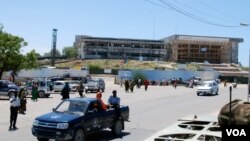ADDIS ABABA - Somalia's main political entities have ended three days of often-heated talks, saying they remain committed to a political process leading to a post-transitional government by August.
Participants say the United Nations-sponsored talks were surprisingly congenial given the number of contentious issues facing Somalia's often-hostile clans.
In the end, the six parties agreed to put some difficult issues, and many of the less important ones, aside in the interest of keeping to a timetable for creation of a post-transitional government in less than 90 days.
Transitional Prime Minister Abdiweli Mohamed Ali, considered the driving force behind the so-called Road Map timetable, said the parties had been motivated by the desire to end Somalia's reputation as a failed state. "Sometimes you can have some kind of heated discussions, but ultimately all signatories have shown they are committed to ending this transition on time to take Somalia to the next level and to bring Somalia back to community of nations as a useful member as it has always been," he said.
The agreement signed at the end of the talks commits all sides to a rigorous schedule for rebuilding the state.
It calls for formation of a Constituent Assembly within four weeks, and adoption of a provisional constitution by July 10th. That will be followed 10 days later by the swearing in of a new parliament, which will complete the transition by electing a president before the transition deadline of August 20th.
Transitional President Sheikh Sharif Ahmed, who could lose his post in the process, hailed the new spirit of cooperation among clans and factions, some with long histories of squabbling. He spoke in Somali with an interpreter. "All road map signatories came with goodwill and good faith and open mind and we have done good work together. And we have made new commitment to work closely for the remaining time of transition," he said.
The African Union special envoy for Somalia, former Ghanaian president Jerry Rawlings, hailed the new attitude that seems to be bringing Somalia back from 20 years of lawlessness and misery. He said as recently as six months ago, few would have taken seriously talk of a functioning post-transition government.
Rawlings said part of the credit goes to Prime Minister Ali, an academic who returned to his native country from the United States less than a year ago. "Some kind of chemistry, as I've described it, some kind of dynamics seems to have taken place that is bringing the body politic together. They seem to be jelling, and the only way I can describe it in one word is that the political process has finally given us some hope," he said.
Several participants also credited Somalia's improved security environment as a key factor in creating a stable political atmosphere.
A newly energized African Union military force has cleared Mogadishu of al-Qaida-linked extremists for the first time in years. And as the meetings were ending, word was received from the battlefield that pro-government forces are routing the extremists in another of their strongholds northwest of the capital.




